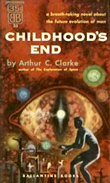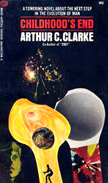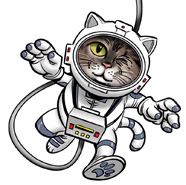
[Mild spoilers.]
      Childhood's End remains, after over half a century, one of SF's boldest and most unusual works. It's an alien invasion novel in which the invading aliens kill us, essentially, with kindness. In keeping with its Cold War origins, there's an overriding cynicism about humanity's seemingly implacable rush towards its own destruction. And in times of strife, people have always looked to a higher power to save us from ourselves. It's as if humanity is trapped in perpetual childhood, unable to relinquish its fears, superstitions, and us-against-them ideologies, yet at the same time tragically aware of these shortcomings and helpless to do anything about them other than long for a celestial, all-powerful parent figure to come along and give us a hug. But what if that higher power emerged, and it was not whom or what we expected? And what if the transcendence it offered by saving us came with one little catch...? Childhood's End remains, after over half a century, one of SF's boldest and most unusual works. It's an alien invasion novel in which the invading aliens kill us, essentially, with kindness. In keeping with its Cold War origins, there's an overriding cynicism about humanity's seemingly implacable rush towards its own destruction. And in times of strife, people have always looked to a higher power to save us from ourselves. It's as if humanity is trapped in perpetual childhood, unable to relinquish its fears, superstitions, and us-against-them ideologies, yet at the same time tragically aware of these shortcomings and helpless to do anything about them other than long for a celestial, all-powerful parent figure to come along and give us a hug. But what if that higher power emerged, and it was not whom or what we expected? And what if the transcendence it offered by saving us came with one little catch...?
  As Arthur C. Clarke's work at this time was about as hard as hard SF got, the way he dives into the deep end of the philosophical pool in Childhood's End caught a lot of readers by surprise. Indeed, its message is such a stark repudiation of the optimistic futurism of such novels as Earthlight and The Sands of Mars — stating quite bluntly, "The stars are not for Man" — that it's not surprising some readers might have wondered what the hell was going on. With the benefit of hindsight we see Childhood's End as the launch pad for a whole new set of thematic concerns Clarke would go on to refine in his 2001 and Rama stories. Suppose we aren't alone in the universe after all, and not only is that the bad news, there is no good news. It isn't that aliens are all a bunch of tentacled BEM's waiting to death-ray our cities into molten sludge and cart off our women. It's that they're so spectacularly advanced compared to us that they might as well be gods, and we're no more than children. There aren't many epiphanies that can deflate the ego quite like that, especially the ego of a species that has spent millennia convincing ourselves we simply must matter in the grand scheme of things, whatever that is. As Arthur C. Clarke's work at this time was about as hard as hard SF got, the way he dives into the deep end of the philosophical pool in Childhood's End caught a lot of readers by surprise. Indeed, its message is such a stark repudiation of the optimistic futurism of such novels as Earthlight and The Sands of Mars — stating quite bluntly, "The stars are not for Man" — that it's not surprising some readers might have wondered what the hell was going on. With the benefit of hindsight we see Childhood's End as the launch pad for a whole new set of thematic concerns Clarke would go on to refine in his 2001 and Rama stories. Suppose we aren't alone in the universe after all, and not only is that the bad news, there is no good news. It isn't that aliens are all a bunch of tentacled BEM's waiting to death-ray our cities into molten sludge and cart off our women. It's that they're so spectacularly advanced compared to us that they might as well be gods, and we're no more than children. There aren't many epiphanies that can deflate the ego quite like that, especially the ego of a species that has spent millennia convincing ourselves we simply must matter in the grand scheme of things, whatever that is.
When the Overlords arrive in their colossal spaceships and promptly assume management of the Earth, things actually begin to look up for the human race for the first time in our checkered history. Peace and prosperity are to be had by all. War and strife are abolished. Utopia is finally here. And boy, does it get boring quick. It isn't that most people mind a life in which, for the first time, no one must struggle to survive and wealth and happiness are out of no one's reach. Even those suspicious of the Overlords are willing to acknowledge the good they've done. But a utopian existence is a decadent one, in which few feel motivated to excel. Even the arts stagnate, as aesthetic revolutions, like military ones, are only ever born in a climate of tension and rebellion. And besides, what exactly are the Overlords getting out of all this? And why won't they reveal themselves, their physical forms, to humanity? The other shoe is bound to drop soon, and many fear it's likely to be a steel-toed boot.
The early passages of Childhood's End can be read, in a sense, as a commentary on colonialism. Some may argue that for all the faults of colonialism as practiced by Britain and other European nations in the 19th century, there were undeniable benefits, with many poor and undeveloped nations getting education and medicine for the first time (along with smallpox and religion, too, but nobody's perfect). But morally, is it the better choice in the long run to let societies develop as they may, without external influence from the civilized world, even if these developing societies never develop well enough to compete in the end? Clarke offers no pat answer to this long-argued conundrum. But he does make the point that even under the most beneficent of masters, people will chafe for independence. What is freedom without the freedom to make your own mistakes?
  Truth to tell, the novel has some storytelling problems as Clarke propels us into its final, elegiac chapters. The introduction of a new phase of human evolution that effectively spells the end of our species as we know it is simply too abrupt to be entirely believed. And its plausibility issues aren't helped by Clarke's dilettantish dabbling in paranormal concepts — popular delusions like telepathy that he employs in his story while taking great pains to assure us he really thinks are complete drivel. Here Clarke engages all too readily in author's convenience (time going backwards when it's convenient to move the plot along), and the narrative is logically weakened for such self-indulgence. Truth to tell, the novel has some storytelling problems as Clarke propels us into its final, elegiac chapters. The introduction of a new phase of human evolution that effectively spells the end of our species as we know it is simply too abrupt to be entirely believed. And its plausibility issues aren't helped by Clarke's dilettantish dabbling in paranormal concepts — popular delusions like telepathy that he employs in his story while taking great pains to assure us he really thinks are complete drivel. Here Clarke engages all too readily in author's convenience (time going backwards when it's convenient to move the plot along), and the narrative is logically weakened for such self-indulgence.
I'd usually be more brutal towards a novel for such gaffes. But Childhood's End, in the end, merits its classic standing for both the emotional impact it has, and the ease with which one can forgive the story its logical failings in light of its ideas and innovation. Clarke was exploring new storytelling territory here. That he loses his way now and again is ultimately irrelevant in that he does end up where he meant to in the end. The final chapter is a genuine tour de force. And one is struck by how smoothly and inevitably the novel segues from utopian fantasy to requiem, without ever taking the obvious route, or getting unduly saturnine.
Childhood's End is a book that perhaps, in all honesty, overreaches. Can it possibly be true that our only future options as a species are annihilation either by all-out war or at the capricious hands of some ineffable higher power? I think not. But I can see how, 50 years ago, with two bellicose superpowers aiming weapons of mass destruction at each other, things looked bleak for poor Homo sapiens in general. If Childhood's End was Clarke's way of coming to terms with a hostile and excessively weaponized world gone mad, as so many of his fellow writers were doing at the time (Nevil Shute in On the Beach and Walter M. Miller in A Canticle for Leibowitz, to name but two), then the eloquence with which he does so remains moving to this day. Sure, the human race is a mess. But in our imperfections lies our humanity. With so many great achievements to contrast all our evils, it says a lot that one of Clarke's Overlords can say, even as the curtain descends on our poor doomed species, "Remember this — we shall always envy you."
In 1991, Clarke substantially rewrote the prologue. In the original, it established the arrival of the Overlords by presenting two characters on opposite sides of the Iron Curtain, who simultaneously come to realize the Space Race between the U.S. and the Soviets is well and truly over. In the rewrite, the scenario changes to the post-Cold War world, with a couple of characters prepping for the first international spaceflight to Mars. There's nothing wrong with the rewritten prologue as such, only that it's unnecessary. In the sense that the original was written nine years before John Glenn became the first American in orbit, its prologue more effectively conveys exactly what is at stake, and what is lost, by humanity's first alien encounter. And the original's Cold War-era setting does match the rest of the narrative — especially the notion that the Overlords came to save us from self-destruction — more consistently. Apart from the prologue, Clarke made no changes to the rest of the book. Artistically, I prefer the original. |
